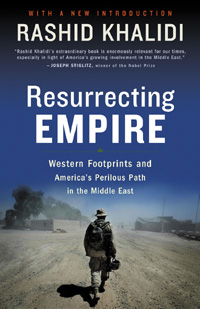
By Rashid Khalidi. Columbia University
The United States, and the world, now faces a situation of unprecedented difficulty in Iraq. There is deep resentment among Iraqis, including those grateful for the overthrow of the Ba’th regime, at the months of chaos in Iraq since the end of the war, at the unresponsiveness of the American occupation authorities, and at the slow pace of the move toward genuine self-government. American troops increasingly risk being received as are most occupation armies, and as were the British in Iraq after World War I: with hostility and ultimately with widespread armed resistance. The paralysis of the American authorities in Baghdad, which reflects the paralysis in Washington, as the administration’s factions struggle over decisions in Iraq, and the inflexible, highly ideological, and ultimately self-defeating line that has generally prevailed, have exacerbated the situation. Reliance on Pentagon-favored exiles loathed by most Iraqis, who see them as carpetbaggers, has already hurt the position of the United States in Iraq, an may lead to an even worse situation there when the inevitable backlash against their machinations sets in. This is only the tip of the iceberg, as is manifest from reporting in the non-American media on the situation on the ground in Iraq, one whose gravity has not been fully reflected in the American media—although American casualties in Iraq, and lengthy deployments of both regulars and reservists finally seem to be having an impact on American public opinion.
Any solution to this problem must recognize a few basic facts: The first is that Iraq is an artificial state, but no more so than most other states in the world today, and like them it has developed a powerful national identity and a patriotism that withstood a grueling nine-year was against its much bigger neighbor, Iran, It would be very unwise to ignore that patriotism, as is apparently being done by the Coalition Provisional Authority (“CPA stands for Condescending and Patronizing Americans,†a Baghdad diplomat told a Newsweek reporter). The second is that the Iraqi state is a creation of international agreements, and that is creation was midwifed by the world body of the day, the League of Nations, although this seems to have been long forgotten by the international community, and Iraq thus constitutes an international responsibility. The third is that Iraqis and others in the Middle East have a strong sense of history: not only do they not forget their experiences with the British occupation; they recall vividly the history of earlier occupations of Baghdad, such as that in 1258 when it was sacked by the Mongols. Bringing even a symbolic contingent of Mongolian soldiers to join the forces of the “Coalition,†as the United States has done, is a perfect example of how to trample on the sensibilities of such people.
In my view, the least damaging approach to this situation at this point would be the reestablishment of an international mandate over Iraq for a strictly limited period. A new U.N. mandate may be the only viable solution if Iraq is to be rescued from the abyss in which its status as a failed state, and the thirteen-year-long conflict with the United States—from the invasion of Kuwait, through the sanctions, the invasion, and the occupation—have left the country. This means starting from the premise that Iraq as a modern state was created by an international mandate (that of the League of Nations); that on the basis of the behavior of its government toward both its people and its neighbors, the experiment that started with the first League of Nations mandate over Iraq has proven a failure; and that the international community which mandated the creation of the Iraqi state has the responsibility to step in to redo what was done wrong the first time and to help the Iraqi people rapidly reestablish their independent statehood on a democratic basis.
[Excerpt from Rashid Khalidi, Resurrecting Empire: Western Footprints and America’s Perilous Path in the Middle East (Boston: Beacon Press, 2004), pp. 171-173.]